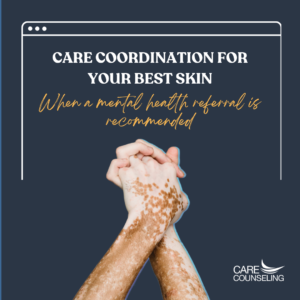Care Coordination for Your Best Skin: When a Referral to a Mental Health Specialist is Recommended
 Did you know that skin is the body’s largest organ? Skin plays an important role as a protective covering of the body and can be an indicator of overall health since distress to the skin can indicate concerns both medically and mentally. In addition to the role of protector, the skin helps us produce vitamin D, regulate temperature so we can cool down (via sweating), serve as a defense against infections, and act as a sensory organ (to experience pain, pleasure, pressure, and temperature changes).
Did you know that skin is the body’s largest organ? Skin plays an important role as a protective covering of the body and can be an indicator of overall health since distress to the skin can indicate concerns both medically and mentally. In addition to the role of protector, the skin helps us produce vitamin D, regulate temperature so we can cool down (via sweating), serve as a defense against infections, and act as a sensory organ (to experience pain, pleasure, pressure, and temperature changes).
When there is a concern related to conditions and treatments of the skin such as acne, dermatitis, or unusual changes to the skin, most people first seek treatment from their primary care doctor or a dermatologist. Skincare specialists including those who work in spas, health and wellness settings, the beauty industry, and cosmetic/ plastic surgeons may be consulted and sought out for concerns and solutions. These professionals offer valuable services to those seeking support for their skincare needs.
It is considered best practice to coordinate care with a mental health specialist when there are indicators that a referral to a therapist is needed. Care coordination is collaboration to address gaps in care that may not occur with providers who are not specifically trained in the diagnosis and treatment of mental health conditions. There are many concerns related to the skin that also show up in the mental health setting. It is important to be familiar with these concerns that may indicate a referral to a mental health specialist is needed.
Adjustment Difficulties
The presence of skin conditions can cause distress at various ages and stages such as acne, psoriasis, skin cancer, rosacea, and vitiligoto name just a few. Emotional and behavioral responses that may be more than expected in response to recent stressors can indicate an adjustment disorder.
Hormonal Changes
Hormonal changes are common causes of acne in the teenage years and acne throughout adulthood. Hormonal acne is impacted by fluctuations of estrogen, progesterone, and testosterone; these changes can impact mood such as depression. Medications, antibiotics, diet, mental health triggers, stress, or other factors can contribute. It is estimated that 40% – 50% of adults ages 20-40 have acne on the body, and that acne affects approximately 50% of women ages 20-29, and 25% of women ages 40-49. Menstruation cycles, pregnancy, and menopause are all factors.
Depression
Skin conditions can trigger feelings of sadness and depression. Some indicators may include loss of interest in going places or being around others, social isolation and feeling bad about self/ appearance, irritability and frustration, changes in sleep, appetite, and/ or energy levels, negative or suicidal thoughts, and low self-esteem.
Anxiety
Problems related to the skin can create excessive worry, especially related to health and appearance. There may be a fixation on the skin, avoidance of people, places, or situations due to anxiety, panic attacks, and general feelings of insecurity. Social Anxiety involves excessing anxiety and fear in social situations in which humiliation, embarrassment, judgment, and negative evaluation may be present. Physical symptoms such as nausea, sweating, muscle tension as well and avoidance are often experienced in social anxiety disorder.
Obsessive-Compulsive Related Disorders
Disorders related to obsessive-compulsive disorder such as body dysmorphic disorder, and trichotillomania involve the skin. In body dysmorphia, obsessions about physical “defects” are present, along with compulsions. The individual experiences difficulties in which they can’t stop thinking about one or more perceived flaws in appearance. This may appear minor or not visible to others. Excessive time is often spent on checking and engaging in other compulsions for short-term relief. This may include time-consuming efforts to fix and hide flaws such as numerous visits with skin professionals and cosmetic procedures. Embarrassment, shame, and avoidance are often heightened.
Excoriation disorder (also known as skin picking or dermatillomania) is also in the obsessive-compulsive category. Excoriation involves repetitive skin picking that leaves damage to the skin and significant distress or impairment of functional areas. Trichotillomania (hair-pulling) results in noticeable hair loss and impacts the health of the skin.
We’d love to collaborate on mental health treatment options available at CARE Counseling. Click here for our expert care: https://care-clinics.com/
Written By: Charlotte Johnson, MA, LPCC



























